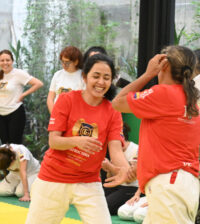- Belgium comes to Yamashita Park
- Residential Villa in Phuket Entices Remote Workers With Long-Stay Rates
- Rare pieces of French glass art at the Mirai Museum of Art
- Feast on fresh fish and seafood at the 2024 ‘Sakana’ Festival
- Would you like to ride in a Louis Vuitton gondola lift?
- Naked Snow Aquarium
- Festive lights at Yomiuriland will get you feeling the holiday vibes
Learning Problems in Disguise

By Dr. Marielle Gorissen-Van Eenige
As all parents and teachers know, children enter school with a wide range of abilities. Although teachers try to find ways to meet the learning styles of each student, some children will still struggle to learn in one or multiple domains. Assuming that the child has an average or above average intelligence, this may be due to a specific learning disability for example, a reading disability, a math disability, writing disability, a visual processing disorder or a combination of these. Other children struggle in multiple domains because they find it hard to pay attention and to get organized, or because they have no clue what the social demands are in a classroom. Media attention for ADHD, autism spectrum disorder, dyscalculia, dyslexia and many others has, on one hand, fortunately led to more understanding for these issues, but on the other hand it has caused parents and teachers diagnosing these children without really ruling out other issues that mimic a disorder. Some learning problems look from the outside differently than what they really are. And why would it matter? Because the intervention or support these children need is often very different. Let’s look at some of these common disguises that I notice in my clinical practice.
The inattentive 3rd grader
Pete had a hard time staying focused, in particular, during carpet time, and usually would run off and instead, get one of his favorite building games. His teacher found that he was getting off target quite a bit when responding to questions. One-to-one he was doing so much better than when requesting to do things in the classroom. Also, he profited tremendously from repeating instructions and breaking up multiple step instructions in shorter one-step instructions. He would sit close to the teacher who could check for his focus. Nobody had any doubts about his intelligence. Briefly, a typical ADHD kid …… so the school and parents thought, and a medical doctor diagnosed after a 15 minutes interview with the parents.
Serendipity brought Pete into my office and just talking to the boy made it clear that his sentences were not well constructed for a child his age. Also he used some words incorrectly and he would often ask me to repeat questions or remarks while at other moments, showed normal comprehension. After talking to his parents and assessing the boy, it became clear that his attention as such, was not really an issue. But Pete had mild language problems, both in expressing himself and in comprehending. It’s no wonder that he was not paying sufficient attention during carpet time, when nearly all activities are language-based, and that he was not on target in his answers. Yes, he would certainly profit from one-to-one instruction because one tends to point more, rephrase, etc. so that comprehension would be easier than during classroom teaching. And why did it matter to diagnose what was really going on? Pete was getting some accommodations that helped him to better function in the classroom, but these did not improve his underlying problem. The boy required an intervention from a speech and language therapist to really address his language issue. Such an intervention had unfortunately been delayed for a few years due to an erroneous ‘self’ diagnosis.
Learning in a construction pit
Learning disabilities should not be confused with learning problems that are primarily the result of visual or hearing issues, intellectual disabilities or emotional issues. What may look like a dyslexic (a reading disorder) child may in reality be a child struggling with reading because there are things going on at home! Every now and then I assess children who are struggling with acquiring literacy skills for another reason, namely hearing issues. Children with a current (or a history of) middle ear infections are specifically at risk for this. Nevertheless, in fact studies show that young children in general are not sophisticated listeners! When there is no background noise they can hear words and sentences as well as an adult, but when there is background noise they understand much less than an adult. The ability to listen like adults in noise conditions develops till in the teenage years. Moreover, the ability to understand spoken English when it is noisy depends on the English proficiency. Can you imagine what an effortful task hearing can be for a non-native English speaker, in a classroom environment with humming heaters or aircons, other children talking and moving, exterior noises and far- from-perfect acoustics because of the hard surfaced floor? Now imagine that child having to learn to read and spell and for that has to learn to distinguish the sounds in the words “m-a-p” from “m-a-t“ and “b-e-d” from “c-a-t” while in a noisy classroom.
Adults (hence teachers and parents) are not good in judging how much children are bothered by background noise, because our ability to listen has fully matured. How different it is for that 7 year old, non-native English speaker. Hearing the teacher saying the words of the spelling test in a noisy classroom may be for that kid more like listening to the teacher while sitting in a construction pit! And that is even more the case for the 15% of children who have mild hearing loss. So before you “diagnose” your child with a learning problem, please have his/her hearing thoroughly checked, certainly when your child has a history of chronic middle ear infections.
Playdates for children with an autism spectrum disorder
Children with an autism spectrum disorder can find it hard to connect to peers. Are you looking for another family to organise for example, a playdate, a Lego play group or a swimming date for your child?
Children/Adolescents with an autism spectrum disorder benefit from being involved in social activities with other children, but it can be hard to find children with similar interests and challenges, to play with. Many families with children on the spectrum feel a sense of isolation, in particular, for an international family living in Japan. Opportunities to socialise for the child, and to share worries and experiences for parents, are lost. Let’s find that play date for your child. For more information, see www.tokyoneuropsychologist.org/playdates-for-asd-kids.html This is a free service for families living in Japan.


















